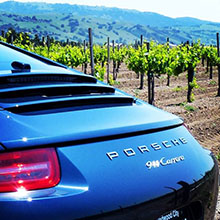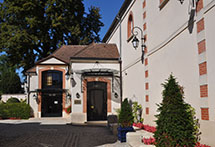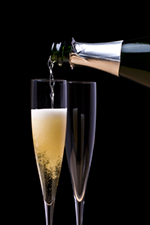|
| |
| Recent Labels |
| |
| Non-Vintage |
| |
| Nicholas Francois Billecart |
|
|
|
|
| |
| |
| |
Billecart-Salmon Brut Reserve Champagne
Billecart-Salmon Brut Reserve is Billecart-Salmon's house style champagne. Billecart-Salmon Brut Reserve is a very enjoyable, balanced, non-vintage champagne. It is readily available in most markets.
| Billecart-Salmon Brut Reserve |
| Type |
|
|
|
|
| Category: |
Basic |
Prestige Cuvée: |
No |
|
| |
| Ratings (on a scale of 100) |
|
|
|
|
| Champagne 411 |
90 |
Nov. 2013 |
|
Average Retail Price |
| Wine Enthusiast |
91 |
12/01/13 |
|
(750 ml bottle) $50 |
| Wine Spectator |
90 |
10/31/13 |
|
|
|
|
|
|
|
|
Tasting Notes
Appearance: Pale yellow with fine persistent bubbles.
Aroma/bouquet: Apple, pear, strawberry, gingerbread. Hints of almond.
Palate: Apple, pineapple, chalky minerality with some brioche.
Additional comments: Very enjoyable balanced non-vintage champagne.
When to drink: Billecart-Salmon Brut Reserve Champagne is ready to drink at release and 3 to 4 years after.
| Brut Reserve Details
Label: Billecart-Salmon Brut Reserve
House/Winery: Champagne Billecart-Salmon
Wine Category: Sparkling Wine
Region & Country: Champagne, France
Type (Style): Non-vintage
Sweetness Level: Brut
Dosage: 9 grams per liter or less
Prestige cuvée: No
Vineyards: NA
House Style: Yes
Grapes: 40% Pinot Meunier, 35% Pinot Noir, 25% Chardonnay
Alcohol: 12%
Go to Champagne Details for a description of the above types, characteristics, and grapes. |
Billecart-Salmon Brut Reserve
Production
Billecart-Salmon uses the méthode champenoise for their champagne production. The Brut Reserve is composed of 40% Pinot Meunier, 35% Pinot Noir and 25% Chardonnay. The dosage varies, usually 9 grams/liter or less. Billecart-Salmon tailors the dosage for each release. Aging can range from 2 to 3 years on the lees. The closure for Billecart-Salmon Brut Reserve is DIAM cork instead of natural cork. DIAM is 'technical' cork made by combining tiny granules of cleaned cork with synthetic microspheres. It minimizes faults such as Trichloroanisole (TCA or 'corked wine') that occasionally occur with natural cork.
Billecart-Salmon uses a winemaking technique called double debourbage where solids settle to clarify the juice, then a second 'cold' settling occurs at about 40 degrees Fahrenheit for at least 48 hours for the juice after pressing. This process ensures the purest of juice will be used for fermentation. The fermentation process typically takes place over 3 to 4 weeks at a temperature not to exceed 57 degrees Fahrenheit (typical fermentation at most houses is 1 week at about 68 degrees Fahrenheit). |




